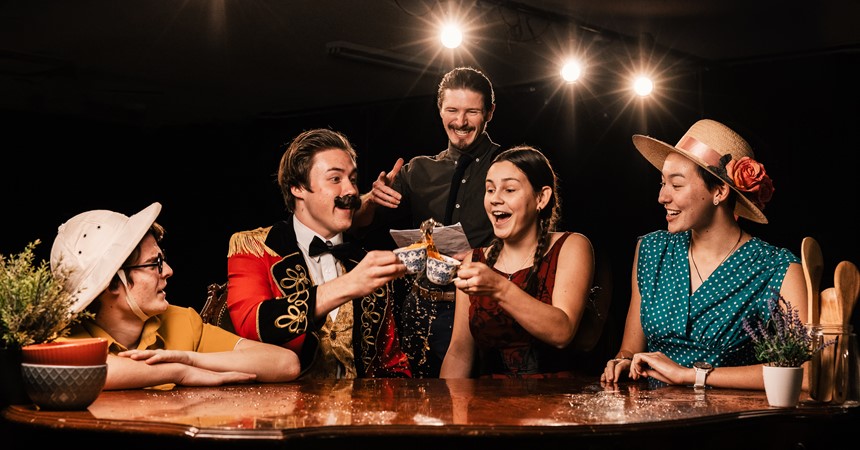Callam Howard, then a painfully shy 13-year-old boy attending St Catherine's College in Singleton, was incorrectly assigned to drama class. When he fronted up, his palms were sweaty and his heart raced.
"I had zero confidence," Callam says of the experience. "However, my teacher Mrs Hall was amazing. She brought me out of my shell and nurtured my unrealised love for drama."
Over the ensuing years, Callam's theatrical skills became increasingly apparent, and his confidence grew in all facets of life. Two decades on, he is a drama teacher at St Clare's High School in Taree.
In Years 9-11, Callam took part in Dio-Theatre Sports, a decision that informed the direction of his adult life. Dio-Theatre Sports is a competition in which school teams participate in various short, improvisation-based theatrical tasks.
"The competition can be quite daunting, and younger students often look up to the more experienced participants for guidance," Callam says. "I loved Dio-Theatre Sports, not just for the adrenaline and performance opportunities, but because as I moved up I had the opportunity to mentor younger students."
It was then that Callam finally felt he could answer with confidence the age-old question, "what do you want to be when you grow up?"
With his sights set on becoming a drama teacher, Callam fully invested himself in his HSC performances and his commitment resulted in a short-listing for OnSTAGE. Held annually at the Seymour Centre in Newtown, OnSTAGE showcases the performances of the state's top-ranking HSC drama students. Eight individuals and 10 groups perform each year.
Unfortunately for Callam, a car accident prevented him from realising this dream. But now, as an HSC drama teacher, he has experienced the next best thing. Over the past four years, several students from St Clare's High School have unleashed their theatrical talents to standing applause at the iconic event.
"St Clare's has had three students deliver their individual monologues, and one group," Callam says. It is a result unparalleled by any other regional or rural schools in the state and outshines many metropolitan schools with far greater cohorts.
So, what is the key to a winning performance? Callam says playing to a student’s strengths is vital.
"If a student can do something unique such as juggling, beatboxing, handstands, shadow puppetry or dancing, it's important that they play on it and build a character around it," he says. "This approach showcases the student’s talent and has the added benefit of separating their performance from a standard ‘walk and talk' monologue.”
Those individual strengths are also usually a student's passion, and that passion is also important.
"Going beyond the lines is what differentiates good performers from excellent performers. It's so important that a student’s lines are so ingrained that they're automatic, enabling them to focus their efforts on acting out those words with conviction."
However, the passion he says should not be restricted to the individual student.
"Relationships are fundamental. You're a drama family. The acting world can be a bit egocentric. It's important students find themselves in an environment where it's about succeeding together. A lot of that comes from the teacher creating
an inspiring atmosphere, but it is also underpinned by students making a concerted effort to create bonds."
Those relationships, Callam says, can be tested. Drama is the only HSC subject where students' marks are contingent on their peers.
"The group performance teaches students about so much more than what's prescribed in the syllabus," Callam says. "As part of developing their presentation students have to collaborate, share creative perspectives, listen and often, there's a bit of conflict resolution involved too."
Callam is an advocate for all students interested in the arts to consider drama as a viable HSC subject.
"Drama teaches you so many skills that can be useful in other aspects of life," he says.
"I often have former students getting in touch to tell me how their experience of working in a group helped them resolve work issues. Or how their presentation skills, finetuned on stage, helped them confidently present in a lecture hall.
"It also helps students to hone their ability to express their thoughts creatively and engagingly. You can talk to someone all day and it might not land. But having the talent to tell a story that resonates is a gift.”
For this reason, Callam hopes that society's tendency to downplay the importance of drama comes to a halt.
"I think there's a lot of pressure for students to give up on creative pursuits once they finish school or not pursue it as a HSC subject… but we must be governed by our passion, no matter what it is, because that's when you get the best results in life. If acting is what you are into, it will make studying a career in science very difficult!"
And, with many of Callam's former students now drama teachers and performers themselves, it seems this message has resonated.
"I'm so grateful I was placed in Mrs Hall's class all those years ago. Her passion has had a profound impact on my life, and it's a great privilege that I'm now able to consult with her as a colleague, as she still works at St Catherine's," Callam says.
"I'm also equally thankful that I now have the opportunity to collaborate with former students in their role as drama teachers. Passion has a domino effect, and it's a wonderful thing to be part of."




























































































